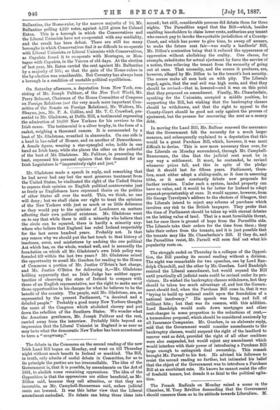Mr. Gladstone made a speech in reply, and remarking that
he had never had any but the most generous treatment from the United States, be vindicated the right of the United States to express their opinion on English political controversies just as freely as Englishmen have expressed theirs on the politics of other States all over the world. This, we think, no one will deny; but we shall claim our right to treat the opinions of the New Yorkers with just as much or as little deference as they would pay to the opinions of Londoners on matters affecting their own political existence. Mr. Gladstone went on to say that while there is still a minority who believe that the circle can be squared, there is hardly a minority any- where who believe that England has ruled Ireland respectably for the last seven hundred years. Probably not. Is that any reason why we should put the last touch to that history of insolence, error, and misfortune by undoing the one political Act which has, on the whole, worked well, and is assuredly the foundation on which all Mr. Gladstone's own Irish policy was founded till within the last two years P Mr. Gladstone seized the opportunity to assail Mr. Goschen for reading to the House of Commons a portion of Mr. Justice O'Brien's last charge, and Mr, justice O'Brien for delivering it,—Mr. Gladstone holding apparently that an Irish Judge has neither oppor- tunities of observing the state of Ireland to compare with those of an English representative, nor the right to make use of those opportunities in his charges for what he believes to be the benefit of the country. The people, said Mr. Gladstone, are, as represented by the present Parliament, "a deceived and a deluded people." Probably a good many New Yorkers thought the same of the Congress which abolished slavery and put down the rebellion of the Southern States. We wonder what the American gentlemen, Mr. Joseph Pulitzer and the rest, carried away from the interview. Probably little beyond an impression that the Liberal Unionist in England is as near as may be to what the democratic New Yorker has been accustomed to term a "mugwump."
































 Previous page
Previous page